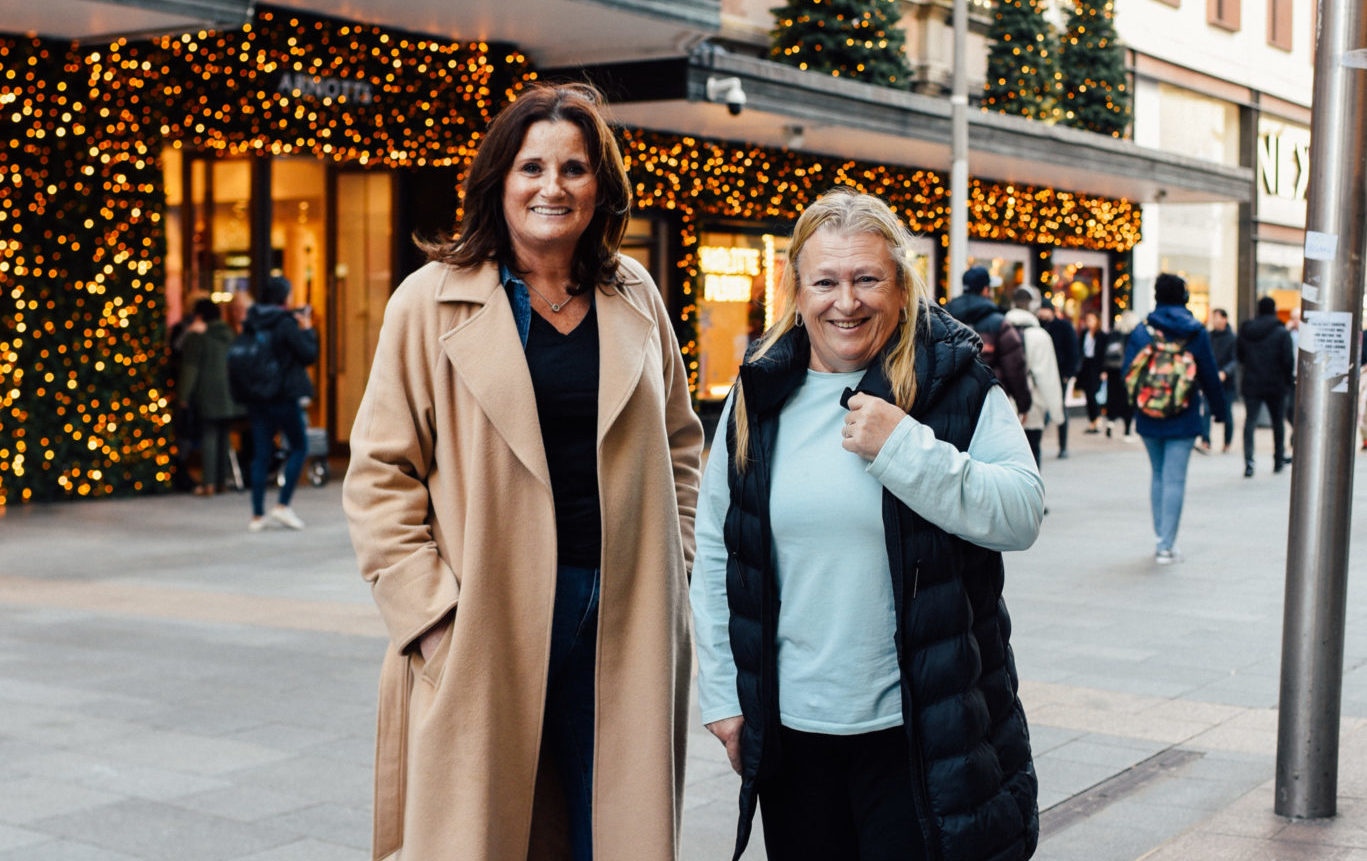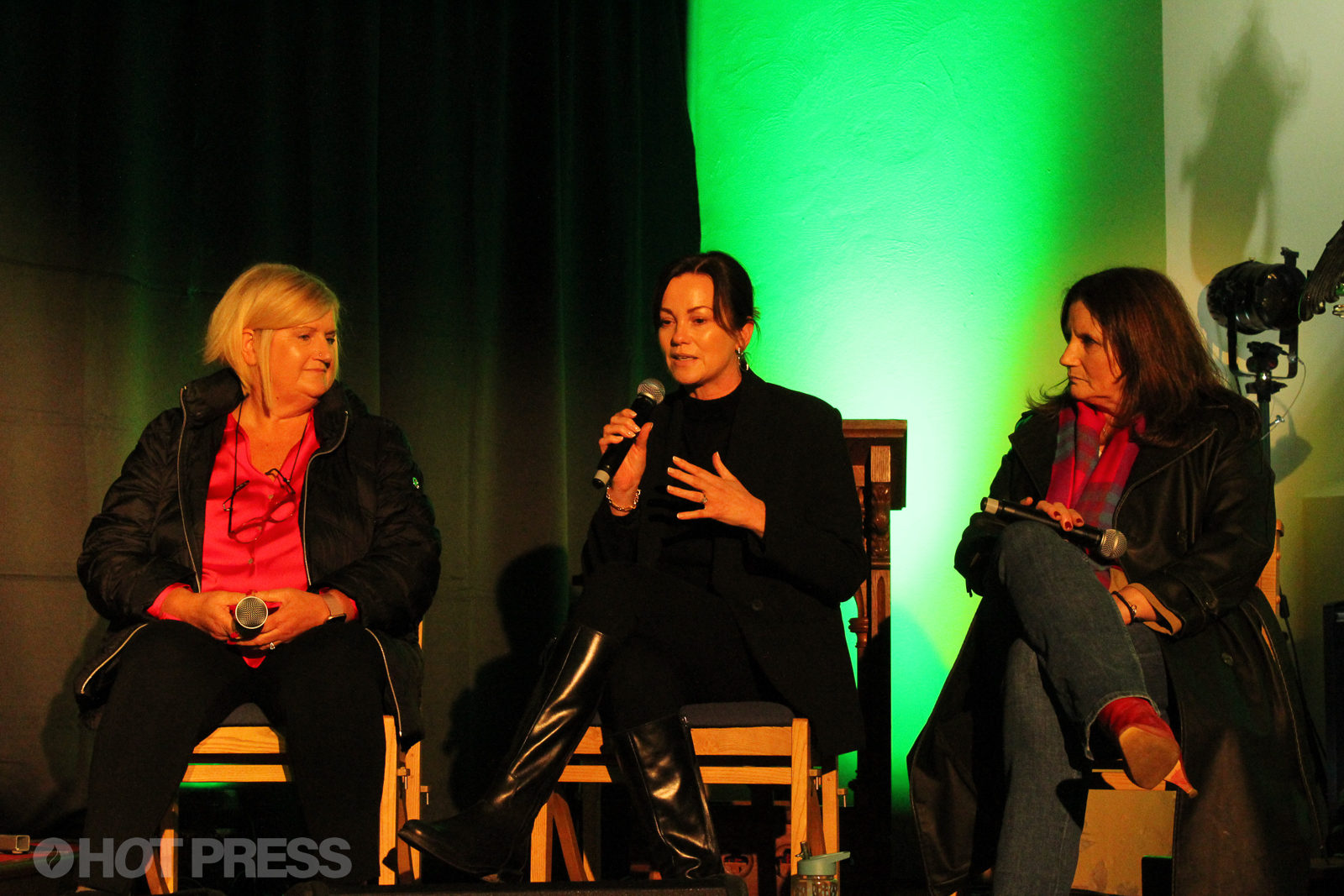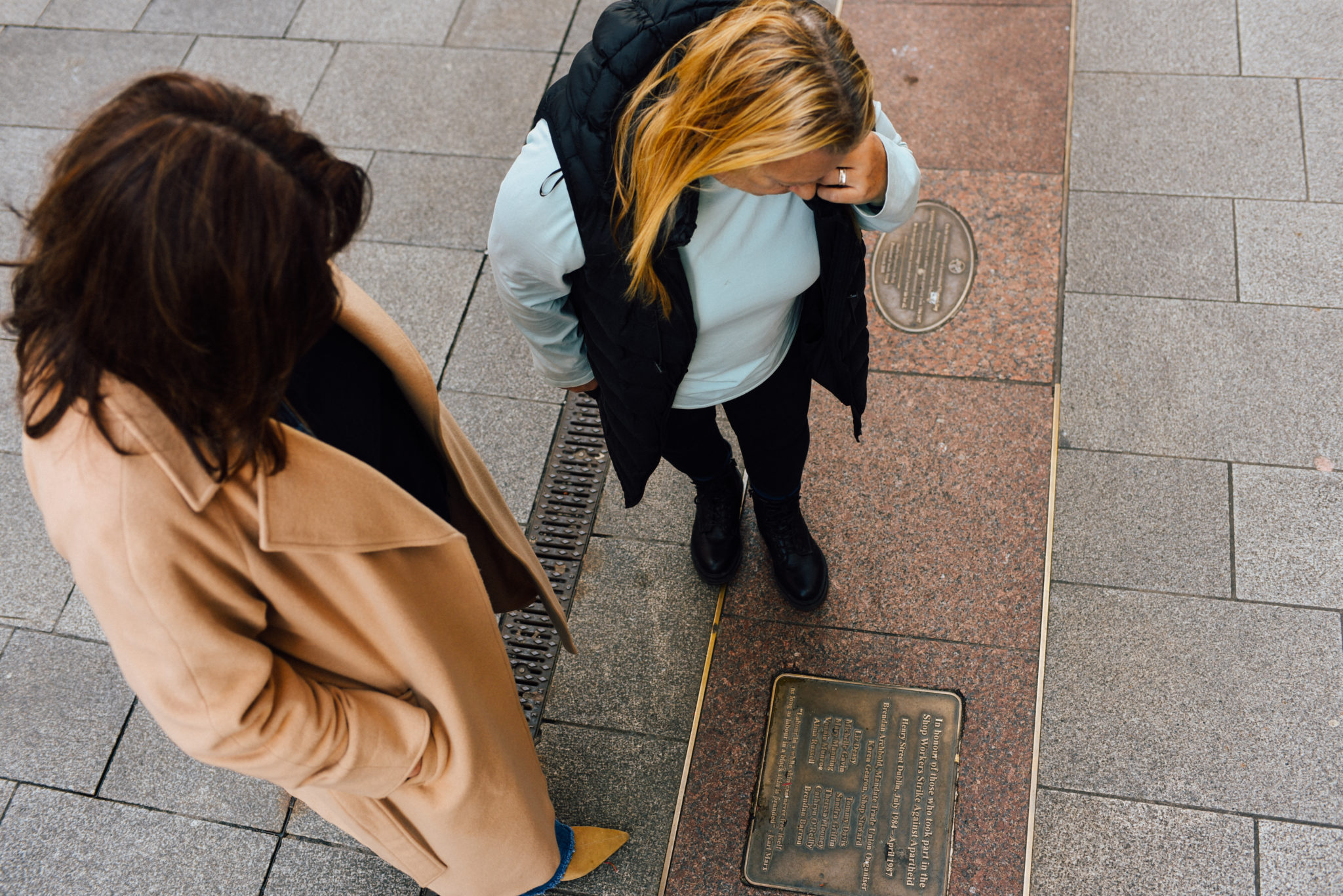- Opinion
- 19 Jul 24

"It was an utterly selfless act of worker solidarity," the President has said of the strike, which began on this day in 1984
President Michael D. Higgins and his wife Sabina welcomed the Dunnes Stores anti-apartheid strikers to Áras an Uachtaráin this afternoon, to mark the 40th anniversary of their famed strike.
The strike began on July 19, 1984, after Dunnes Stores worker Mary Manning refused to handle the sale of grapefruit from South Africa, and was subsequently "suspended indefinitely". A group of workers, mostly made up of young women, walked out alongside their colleague, and began their strike on Henry Street.
“We did get a good lot of support, but it was very slow to start with,” one of the strikers, Cathryn O'Reilly, told Hot Press last year. “People also didn’t really take us seriously, because we were girls, and we were all young. It was like, ‘Sure what would they know, they’re only kids!’”

Vonnie Munroe & Cathryn O'Reilly on Henry Street in 2023. Copyright Miguel Ruiz.
Advertisement
When the support did come, however, it proved crucial. There were days when the crowds gathering to show solidarity for the strike would almost shut down Henry Street.
After an almost three-year battle, the strike ended in April 1987, with the Irish government finally banning South African goods from being sold in Ireland – a ban that remained in place until the end of the apartheid regime.
Those in attendance at the Áras today included Mary Manning and her fellow strikers Liz Deasy, Karen Gearon, Sandra Griffin, Theresa Mooney, Vonnie Munroe McCue, Cathryn O'Reilly, Alma Russell and Michelle Sherlock.
The strikers are also set to attend a celebration event at the Mandate Trade Union headquarters.
Earlier this year, as part of the Nothing Compares series of events, Hot Press was involved in organising a special screening of director Sinead O'Brien's award-winning documentary on the strike, Blood Fruit – which was attended by Mary Manning and Vonnie Monroe.

Mary Manning, Sinead O'Brien and Vonnie Monroe at Nothing Compares at The Moat Theatre, Naas to celebrate Brigid 1500 with Hot Press and Kildare County Council.
Advertisement
You can read the President's full speech from today's event at the Áras below:
A cháirde,
Fearaim fíor chaoín romhaibh uilig tráthnóna.
May I say how delighted I am to welcome you all to Áras an Uachtaráin today.
We are having this recognition to celebrate the courageous Dunnes Stores workers who 40 years ago took the courageous moral stance of refusing to handle the sale of goods from South Africa produced under conditions of Apartheid. That action led to their suspension and subsequent strike action. That defiant act against the Apartheid regime led to information on Apartheid becoming known.
How far-sighted it was for the workers to realise that workers in conditions of low wages could have such a profound effect, that it mattered, that taking actions to demonstrate solidarity with people who were being denied basic human rights in the conditions of Apartheid could yield such emancipatory results. It showed a remarkable moral awareness. It showed how a boycott could bring results.
It is very important for people in 2024 to realise that much of the general public at the time did not have the same level of awareness on issues relating to the Apartheid regime in South Africa which made sustaining the strike very difficult. There were quite a few who would place a higher weight on the price of goods over the rights of people and who felt that workers should “know their place”.
Advertisement
Yes, there were exemplary trade unions, working with the anti-Apartheid movement, as well as many active political groups who were highlighting the appalling consequences and injustices of that regime, but it was this act of defiance, that touchstone moment of the protest against Apartheid, that became so well known, including in South Africa, with messages of thanks and appreciation from Nelson Mandela, the ANC and others.
After Nelson Mandela’s release from prison, he was to regularly mention the significance of the Dunnes Stores workers’ actions in July 1984 – 40 years ago.
May I say, on behalf of the people of Ireland, that all Irish people, all workers, are all so grateful that you, the workers of Dunnes Stores on Henry Street, took that moral stand and refused to handle produce imported from South Africa. It was an utterly selfless act of worker solidarity. For this refusal, you were suspended, marking the beginning of what would be an almost three-year battle by 12 determined and brave workers.
It is probably true to say that on that day in July 1984 few of you present today realised that you had embarked on what would be a particularly lonely road to take on the Irish establishment who opposed the boycott of boycott, that you would write a chapter in international labour history, and win.
The power of your protest and principled stance eventually led the Government of Ireland to ban South African goods from being sold in Ireland, and this ban remained in place until the end of the Apartheid regime. I would like to acknowledge the presence here today of Mary Manning, the courageous and principled woman who started that protest, and the colleagues who stood with her.

Vonnie Munroe and Cathryn O'Reilly. Copyright Miguel Ruiz.
Advertisement
I still recall when Sabina and I visited Robben Island in November, 2014, we were guided around the Prison by a former prisoner turned tour guide, Thulani Mabaso. I remember him vividly describing how hearing about these young women in Ireland who cared so much about their cause had impacted on the inmates, giving them, he suggested, the strength and determination required to carry on.
I ndáiríre ar scáth a chéila a mhaireann na ndaoine.
Reflecting on Ireland’s contribution to the struggle, Mandela said, when he addressed the Houses of the Oireachtas in 1990:
“For more than a quarter of a century your country has had one of the most energetic and effective anti-apartheid movements in the world. Irishmen and women have given wholehearted and often sacrificial support for our struggle in the fields of economic, cultural and sports relations. We, therefore, salute your sportspeople, especially the rugby players, your writers and artists and the Dunnes’ and other workers.”
I recall standing with Noel Browne outside rugby matches with his sign, “Boks go home”.
In the 1980s, the force of growing international condemnation, sanctions and increasing civil unrest in South Africa brought the Nationalist Party to the negotiating table.
During this time, the Asmal kitchen table in Monkstown took a starring role: it was there, that Kadar, with Albie Sachs, another prominent ANC member and lawyer, drafted the earliest version of what would become the South African Bill of Rights, a cornerstone of the constitution of the new South Africa.
Advertisement
You have given us a legacy of profound generosity and empathy. It demonstrates the power of active citizen engagement, participation. It shows how a morally grounded model of citizenship, one based on social conscience, can offer so much potential for the flourishing and deep fulfilment of our citizens.
It is through such acts of courageous, generous social responsibility within and across our communities that people are often first exposed to the value of the pursuit of justice, inclusivity, equality, of the pursuit of peace with nature and each other, to the important concept of citizenship itself.
Four decades on, there is a salutary lesson from this movement. In an era when we are experiencing a rise in global poverty and inequality, when the world averts its gaze to war and conflict, to the continued plight and devastation of the Palestinian people, to the ongoing erosion of workers’ rights and basic human rights, when we turn our backs on migrants seeking sanctuary on our shores, now is the time to invoke the message of your courageous story.
Now is a time to embrace the resolve and build on the moral courage demonstrated by you, the Dunnes Stores strikers, to strengthen belief that we can all effect change, despite the obstacles that may be placed in our way. We must believe that ultimately such commitment will deliver a difference. Actions like yours are needed now more than ever.
May I conclude by thanking you all warmly once again as we celebrate today your courageous act of citizenship. Sabina and I hope that you enjoy your time with us here in Áras and Uachtaráin.
Go raibh míle maith agat agus beir beannacht.










